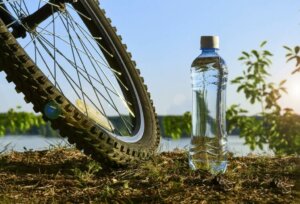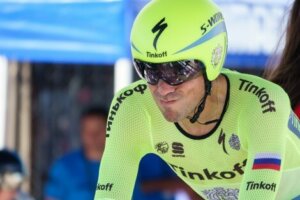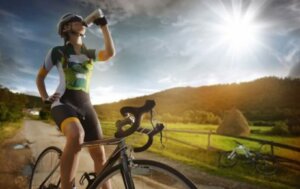Is Water or an Isotonic Sports Drink Best When Cycling?

These days, everyone understands the importance of staying hydrated when participating in sports. And when taking part in endurance sports, getting enough fluids and electrolytes is really important. In this article, we’ll take a look at whether you should drink water or an isotonic sports drink when cycling.
Is it enough to just drink water on a long ride? Or should you also add some salts and nutrients?
The importance of hydration

Once you’re 20 minutes into any form of exercise, you should ideally start to take on some fluids. This helps to prevent drops in performance due to dehydration. Simply waiting until you feel thirsty could mean that it’s too late.
All the scientific literature supports regular water consumption throughout any sporting activity, and for most short events, mineral water should be sufficient. However, this may not always be the case.
Recent studies claim that drinking water containing high glycemic carbs can delay the onset of fatigue. This might mean that an isotonic sports drink rich in salts and sugars might not be a bad choice.

Water or an isotonic sports drink when cycling?
Cycling is generally an endurance sport and this means that athletes lose a lot of fluids and need a lot of nutrients.
Drinking plenty of water on a ride can help prevent hydration problems, but adding fast and slow absorbing carbs can delay fatigue and allow you to save your muscular glycogen for later use.
The relevant scientific literature also supports the addition of mineral salts and carbohydrates to sports drinks for improved performance. In the case of endurance sports, this should involve a combination of high and low glycemic carbs in order to save glycogen and keep the blood sugar curve stable during the event.
This is why an isotonic sports drink is always a better choice than just water. Furthermore, these products contain a lot of mineral salts that help prevent cramps and hyponatremia.
Of course, your fluid needs will vary depending on the climate. In hot, humid weather, you’ll need to drink more frequently because you’ll lose water and salts more quickly.
The dangers of dehydration: isotonic sports drink when cycling
Becoming dehydrated can bring with it a range of problems. Normally, there are a number of warning signs before the situation gets too serious, including:
- Fatigue
- Dizziness
- Nausea
- Headaches
- Increased body temperature
Any of these could be a sign that you’re dehydrated. To avoid this, you should aim to drink a little less than half a pint of fluids roughly every 30 minutes.
When it comes to cycling, there’s a number of other substances that you can use to improve your performance. One of them is caffeine, which improves aerobic metabolism and delays fatigue.

Remember!
You should regularly consume fluids during any sporting activity to avoid dehydration.
For endurance sports, such as cycling, water might not be enough on its own. During this type of event, you’ll also need to replace certain nutrients and salts which are lost over the course of the event.
This is why an isotonic sports drink containing both high and low glycemic carbs might be a better option. It’s also a good idea for them to be reasonably cool so as to avoid stomach problems.
Furthermore, drinks that contain caffeine will improve performance and reduce fatigue.
And last but not least, don’t forget to continue rehydrating yourself after exercising. Ideally, over the course of the six hours following an event or outing, you should consume about 150 percent of the fluids you lost.
These days, everyone understands the importance of staying hydrated when participating in sports. And when taking part in endurance sports, getting enough fluids and electrolytes is really important. In this article, we’ll take a look at whether you should drink water or an isotonic sports drink when cycling.
Is it enough to just drink water on a long ride? Or should you also add some salts and nutrients?
The importance of hydration

Once you’re 20 minutes into any form of exercise, you should ideally start to take on some fluids. This helps to prevent drops in performance due to dehydration. Simply waiting until you feel thirsty could mean that it’s too late.
All the scientific literature supports regular water consumption throughout any sporting activity, and for most short events, mineral water should be sufficient. However, this may not always be the case.
Recent studies claim that drinking water containing high glycemic carbs can delay the onset of fatigue. This might mean that an isotonic sports drink rich in salts and sugars might not be a bad choice.

Water or an isotonic sports drink when cycling?
Cycling is generally an endurance sport and this means that athletes lose a lot of fluids and need a lot of nutrients.
Drinking plenty of water on a ride can help prevent hydration problems, but adding fast and slow absorbing carbs can delay fatigue and allow you to save your muscular glycogen for later use.
The relevant scientific literature also supports the addition of mineral salts and carbohydrates to sports drinks for improved performance. In the case of endurance sports, this should involve a combination of high and low glycemic carbs in order to save glycogen and keep the blood sugar curve stable during the event.
This is why an isotonic sports drink is always a better choice than just water. Furthermore, these products contain a lot of mineral salts that help prevent cramps and hyponatremia.
Of course, your fluid needs will vary depending on the climate. In hot, humid weather, you’ll need to drink more frequently because you’ll lose water and salts more quickly.
The dangers of dehydration: isotonic sports drink when cycling
Becoming dehydrated can bring with it a range of problems. Normally, there are a number of warning signs before the situation gets too serious, including:
- Fatigue
- Dizziness
- Nausea
- Headaches
- Increased body temperature
Any of these could be a sign that you’re dehydrated. To avoid this, you should aim to drink a little less than half a pint of fluids roughly every 30 minutes.
When it comes to cycling, there’s a number of other substances that you can use to improve your performance. One of them is caffeine, which improves aerobic metabolism and delays fatigue.

Remember!
You should regularly consume fluids during any sporting activity to avoid dehydration.
For endurance sports, such as cycling, water might not be enough on its own. During this type of event, you’ll also need to replace certain nutrients and salts which are lost over the course of the event.
This is why an isotonic sports drink containing both high and low glycemic carbs might be a better option. It’s also a good idea for them to be reasonably cool so as to avoid stomach problems.
Furthermore, drinks that contain caffeine will improve performance and reduce fatigue.
And last but not least, don’t forget to continue rehydrating yourself after exercising. Ideally, over the course of the six hours following an event or outing, you should consume about 150 percent of the fluids you lost.
All cited sources were thoroughly reviewed by our team to ensure their quality, reliability, currency, and validity. The bibliography of this article was considered reliable and of academic or scientific accuracy.
- Nuccio RP., Barnes KA., Carter JM., Baker LB., Fluid balance in team sport athletes and the effect of hypohydration on cognitive, technical and physical performance. Sports Med, 2017. 47 (10): 1951-1982.
- Dragusin IB., Horswill CA., Does sport drink use during exercise promote an acute positive energy balance? Int J Sport Nutr Exer Metab, 2016. 26 (5): 428-434.
- Rowlands DS., Houltham SD., Multiple transportable carbohydrate effect on long distance triathlon performance. Med Sci Sports Exerc, 2017. 49 (8): 1734-1744.
- Suzuki K., Hashimoto H., Oh T., Mitsuda H., Peake JM., et al., The effects of sports drink osmolality on fluid intake and immunoendocrine responses to cycling in hot conditions. J Nutr Sci Vitaminol (tokyo), 2013. 59 (3): 206-12.
This text is provided for informational purposes only and does not replace consultation with a professional. If in doubt, consult your specialist.








